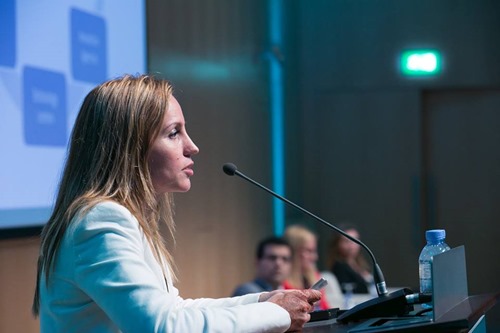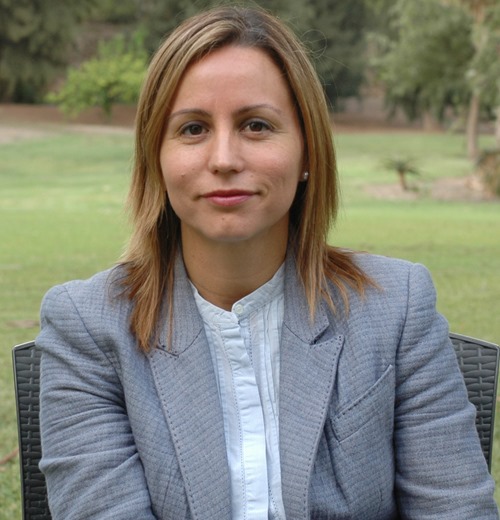Spotlight on women in science parks - Spain
/2018_11_19_Soledad_Diaz_speaking.jpg)
One of the aims of our Women in IASP subnetwork is to raise the profile of female science park managers, and over the next few months we’ll be featuring interviews with members of the group from around the world who will tell us about their journey into the industry, their STP, and gender equality in their country. Today we are talking to Soledad Díaz, managing director of the Association of Science and Technology Parks of Spain (APTE).
1) Tell us a bit about what you do at APTE: what does a typical day involve?
If there's one thing that defines my work at APTE, it's that it's not a routine job. Every day I have to deal with new issues of a different nature. My daily work includes videoconferences with some members to develop specific topics in which they are participating, for example, the work of the APTE commissions and the network of project officers. Through these working groups, I try to develop projects and activities in cooperation with APTE member parks.
Currently, there are 2 topics on which I am focusing a lot of effort since I believe that they are two new projects that will give a new orientation to our Association. One is to encourage scientific and especially technological vocations among women, and the other is to promote the creation of an online training platform so that park entities can keep abreast of disruptive technologies.
I also follow very closely our activity in social networks and our website, taking care of the details in which our information should be published, because it is the best way in which society can know the importance of the activity of parks and support their operation.
2) What was your journey to working in the science park industry – what did you study or work on before joining your organisation? What brought you here?
I started working as an intern when I was in my final year of journalism at the University of Malaga and I never imagined I could work where I do today. I had always wanted to be a war reporter, and before I started university, I tried to join the army. In fact, until I started working at APTE, I didn't even know what a science and technology park was, let alone that there was an association that encompassed them. I think that this is why I am determined to communicate our existence more to society.
3) What do you enjoy most about your job?
I have always enjoyed travelling, contacting new people from different fields and getting to know and learn new things related to new communication technologies. My work allows me to do all that and much more because I also have the chance to see how projects we develop can help parks develop and their businesses improve.
4) Tell us a bit about APTE: what makes it unique? How does it support the Spanish science park industry?
More than an association, APTE is a large family in which people from different regions of Spain, with different political colours agree on a common goal, to support the economic development of their locality or region. It is also a real network, in which we are all effectively connected and the information circulates among us quickly, in such a way that allows us to have a fairly quick response capability. All of the above makes us a unique association.
APTE supports the science park industry by developing an intense collaboration with the rest of the agents of the innovation system so that the parks are participants in the innovation policies of this country. APTE also promotes international relations, especially with Portugal, through its Portuguese counterpart, Tecparques, with whom we have been working for 16 years to promote the collaboration of our parks and their entities. It also supports its parks by disseminating their activities and impact on the innovation system through publications, websites, social networks and projects.
Finally, APTE also supports its parks through a series of services provided by its coordinating unit and through which it aims to facilitate their daily activity.
5) As a female CEO, what is your advice to other women interested in this industry or who work in innovation?
I would say that the world of innovation, especially technology, is a world that needs female knowledge, which is very scarce in this field. I would also say that contributing to technological developments is also helping society, even if the task or the work it develops is not in contact with the public. I would also say that we have to get used to working as a team and supporting each other.
6) How do you see gender equality in your country? How would you describe the participation of women in the field of innovation?
In Spain, as in the rest of Europe, there is a gender gap in STEM that originates at the moment when girls have to decide whether or not to focus their higher education in this area, that is, at 13-14 years of age, and then intensifies. This situation has a negative impact on the development of our innovation system, because we do not have the talent of 100% of the population in the technological field. For this reason, APTE has developed an initiative called "Science and Technology in feminine" that aims to reduce this gender gap by working in the early stages of the phenomenon, that is, with young high school students.
7) What are your thoughts about the importance of gender equality on a global level?
I believe that gender equality is important in all areas of life, not just STEM. In other words, the contribution of 100% of the population in all economic and educational activities is important, as it is the only way to achieve maximum results and benefits.
It is curious, but there are studies that show that in countries with a low level of development or where equal rights are not guaranteed, there is no gender gap in the STEM field. In other words, this gives rise to what they call the STEM paradox, since the situation would have to be the opposite. For this reason, we must work together to reduce gender gaps and, in our case, in the STEM area.
/)



/canvascolor(0xffffffff)/MemberLogo-75401-5958.jpg)
/canvascolor(0xffffffff)/WhatsApp_Image_2024-03-11_at_10.37.06.jpg)
/canvascolor(0xffffffff)/BV_Logo_HS_1.png)
/canvascolor(0xffffffff)/MemberLogo-5701-6142.jpg)
/canvascolor(0xffffffff)/MemberLogo-55602-27601.jpg)
/canvascolor(0xffffffff)/2017_08_04_ATV.png)
/canvascolor(0xffffffff)/MemberLogo-5640-6065.jpg)
/canvascolor(0xffffffff)/Aj_basa_2014_color-fonsgrisE_2.png)
/canvascolor(0xffffffff)/2017_10_30_Singapore_Singapore_SP.jpg.png)
/canvascolor(0xffffffff)/OPENZONE_1.jpg)
/canvascolor(0xffffffff)/MemberLogo-5594-6012.jpg)
/canvascolor(0xffffffff)/MemberLogo-54503-6263.jpg)
/canvascolor(0xffffffff)/2022_11_11_Thailand_Prince_of_Songkla_University_SP.jpg)
/canvascolor(0xffffffff)/logo_21.png)
/canvascolor(0xffffffff)/La_Salle_Barcelon_logo.png)
/canvascolor(0xffffffff)/WCID_logo_forest_green_2.jpg)
/canvascolor(0xffffffff)/IT_park-01_1.png)
/canvascolor(0xffffffff)/sip_zurich_rgb_transparent_1.png)
/canvascolor(0xffffffff)/2024_03_12_High_Tech_Campus_Villach.jpg)
/canvascolor(0xffffffff)/logo-oscuro-parque-cientifico-ua.png.png)
/canvascolor(0xffffffff)/zone_logo_rgb_3_1.jpg)
/canvascolor(0xffffffff)/2024_06_04_Saudi_Arabai_Wadi_Jeddah.png)
/canvascolor(0xffffffff)/2020_10_09_Spain_Geolit.jpg)
/canvascolor(0xffffffff)/IMG_6966_1.jpg)
/canvascolor(0xffffffff)/2023_07_14_Saudi_Arabia_LAB7_Aramco.png)
